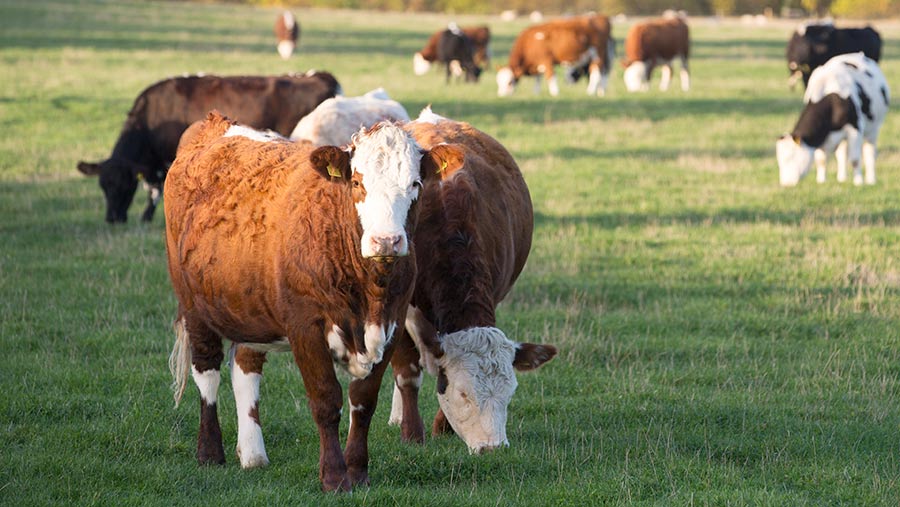UK climate report: Cut red meat by 20% and plant more trees
 © Tim Scrivener
© Tim Scrivener Reducing the number of ruminants and increased tree planting on farmland are key to meeting the UK’s “net zero” carbon ambitions, says the Committee on Climate Change (CCC).
Launching its latest report, Land Use: Policies for a Net Zero UK, committee chairman Lord Deben said the time for discussion was over and the time for delivery had arrived, backed by legislation if necessary.
“Changing the way we use our land is critical to delivering the UK’s net zero target,” he said.
See also: The cost of extreme weather for UK farmers
“Doing so can provide new revenue opportunities for farmers, better air quality and improved biodiversity.
“But major changes are required and action from government is needed quickly.”
According to the report, agriculture currently accounts for 12% of greenhouse gas emissions in the UK, but this can be reduced by almost two-thirds if the right actions are taken.
Specifically, it suggests:
- Reduce consumption of beef, lamb and dairy by at least 20% per person, and food waste by a similar 20%
- Increase tree planting by 100m trees/year, lifting UK forestry cover from 13% to 18% by 2050
- Encourage low-carbon farming practices – such as “controlled-release” fertilisers, improved livestock health and new diets for cattle
- Restore at least 50% of upland peat by “rewetting” them, and banning extraction and heather burning
- Expand bioenergy crops to about 23,000ha/year, including miscanthus and short rotation coppice
The result of all this would be that about 20% of land would be taken out of traditional agricultural production and moved into long-term, natural carbon storage, said Chris Stark, CCC chief executive.
But this would not necessarily mean a reduction in food production, he told a briefing on Wednesday (22 January), so long as there was an improvement in productivity and a change in diet “reducing consumption of the most carbon-intensive food – beef, lamb and dairy”.
Cut methane
This drop in meat and dairy consumption was needed to reduce methane emissions, said Mr Stark, and so contain the rise in global temperatures.
Even though UK grass-fed beef was less damaging than other global systems, it still needed to play its part.
“But it’s very important that we don’t then replace that with the importation of higher greenhouse-gas-intensity meat from abroad,” he said.
“We will need a strong trade policy to make that happen.”
Achieving a 20% reducing red meat consumption should be done by steering people towards the right diet choice, rather than legislating, such as better labelling and improving plant-based offerings in schools and hospitals.
“The main message here is eat a little less meat, but know that you can go for the high-quality produce that we have here in the UK, which has lower greenhouse gas emissions than imported meat,” said Mr Stark.
Carbon credits
As for tree planting, the CCC is suggesting a system of Feed-in Tariffs, similar to those used with renewable energy, or a carbon trading scheme, where farmers can sell carbon credits.
This could be funded by a levy on greenhouse gas emitting industries, such as oil extraction or aviation.
Overall, the CCC estimates that all its recommendations would cost about £1.4bn/year, but would yield net benefits to society of more than £4bn.
How have people reacted?
Minette Batters, NFU
“When talking about changing diets, plant-based products do not always necessarily have a lower impact on the environment. It all depends on where and how the ingredients have been produced, the environmental pressures involved, the environmental management associated with that country’s agricultural system, as well as how far the product has travelled. Sixty-five percent of British land is only suitable for grazing livestock and we have the right climate to produce high-quality red meat and dairy. Therefore, it makes sense that, when talking about environmental impact, the public continues to support British livestock production.”
Andrew McCornick, NFU Scotland
“The industry already plays a hugely significant role in efforts to reduce emissions, through sequestering carbon and the generation of renewable energy. At farm level, positive uptake of efficiency measures around livestock and crop production, soil testing, nutrient management, energy crops and the integration of woodlands into farming will all have a greater role to play, alongside the continued provision of safe, healthy, local food.”
Jo Lewis, Soil Association
“While the committee is right to say that our diets need to change and to highlight the crucial role that public settings such as schools and hospitals can play, it should go further to recommend a reduction in soya-fed meat that is driving deforestation. We need ‘less but better’ meat, sourced from organic and agroecological farms, and an end to intensively farmed meat.”
Vicki Hird, Sustain
“The dietary recommendation to reduce beef and lamb consumption could lead simply to a damaging switch to chicken and pork, without consideration for what these animals are being fed and how they are reared. We need to see more focus on genuinely agroecological and mixed farming, diversifying production, nature restoration and sustainable diets.”
